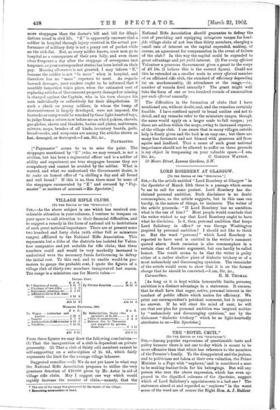LORD ROSEBERY AT GLASGOW.
[To THE EDITOR OF THE "SPECTATOR;']
SIR,—In the article entitled " Lord Rosebery at Glasgow " in the Spectator of March 15th there is a passage which seems to me to call for some protest. Lord Rosebery has dis- claimed personal ambition. Such disclaimer is no doubt commonplace, as the article suggests, but in this case can hardly, in the nature of things, be insincere. The writer of the article proceeds : " If Lord Rosebery has no ambition, what is the use of him ? " Most people would conclude that the writer wished to say that Lord Rosebery ought to have what he disclaims. Is it, then, personal ambition that keeps Lord Salisbury in office P or was George Washington inspired by personal ambition ? I should not like to think so. But the word " personal " which Lord Rosebery is reported to have used is omitted in the writer's comment quoted above. Such omission is also commonplace in a certain class of forensic argument, but can hardly be called honest. The result seems to be that the writer is guilty either of a rather shallow piece of dialectic trickery or of a most melancholy and discouraging cynicism. The remainder of the article would seem to show that it is on the former charge that he should be convicted.—I am, Sir, &c., [As long as it is kept within honourable limits, personal ambition is a distinct advantage in a statesman. It ensures that he shall have that eager, active, personal interest in the conduct of public affairs which makes for efficiency. We print our correspondent's petulant comment, but it requires no answer. If he will clear his mind of cant, he will see that our plea for personal ambition was inspired neither by " melancholy and discouraging cynicism," nor by the dishonest " dialectic trickery " which he so light-heartedly attributes to us.—ED. Spectator.]










































 Previous page
Previous page